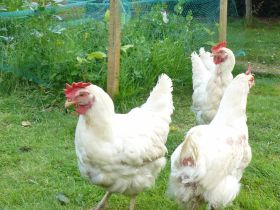Adopting Ex-Battery Hens
Chickens can be extremely beneficial for those who grow food organically at home. They can provide eggs to supplement a diet of fresh fruits and vegetables and can help to create a good quality compost that will enrich the soil and increase yield on your piece of land. What is more, chickens will eat slugs and other garden pests which can help to keep your plants safe. They will scratch over the soil, helping to clear weeds, aerating the soil and helping you to maintain a healthy soil ecosystem in your garden. While your growing area will need to be protected from chickens, having some hens in your garden will really help you to develop a good permaculture system and a garden that will be there for your family's food and enjoyment for years to come.

April is a good time to consider getting some hens. You could choose to buy some hens from a local source, but why not consider adopting some ex-battery hens and giving these poor creatures a new lease of life? Ex battery hens may not lay as reliably as hens you can buy from someone who has reared them locally but they will usually provide some eggs as well as benefiting your garden in the other ways described above. April or May is a good time for re-homing since ex-battery hens will often have lost many of their feathers and be in a poor state of health. They will therefore be more vulnerable to the cold. Introducing these poor creatures to their new home in the spring will mean that they will have the warmer summer ahead of them in which to recuperate and get used to their new lives.
Seeing ex-battery hens fresh from the factory farms will often be something of a shock and if you did not already buy free range eggs then you will do
 after the event. Though some hens will look worse than others, many will be missing plenty of feathers. Their combs will be pale and droopy. These are creatures who, most likely, will never have seen grass before, nor scratched in the dirt outside. However, introduce them to your garden, treat them kindly, and you will be amazed by how quickly they begin to thrive. Very quickly, they will regrow their feathers and their combs will turn a far brighter red and stand proud. Their chicken instincts will kick in and they will begin to scratch, cluck, forage, have dust baths and sunbathe in a warm spot.
after the event. Though some hens will look worse than others, many will be missing plenty of feathers. Their combs will be pale and droopy. These are creatures who, most likely, will never have seen grass before, nor scratched in the dirt outside. However, introduce them to your garden, treat them kindly, and you will be amazed by how quickly they begin to thrive. Very quickly, they will regrow their feathers and their combs will turn a far brighter red and stand proud. Their chicken instincts will kick in and they will begin to scratch, cluck, forage, have dust baths and sunbathe in a warm spot.
